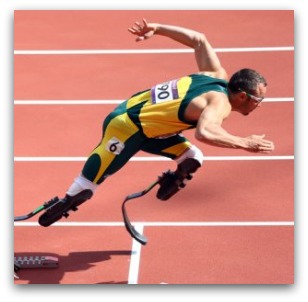
The Paralympics have been paired with the Olympic Games since Rome 1960. They are a good and necessary fit.
In many ways, they represent an antidote to the Olympic movement, which fosters the deification of athletes. The Paralympics account for, and affirm and celebrate, diversity in the physique of human beings.
The low point of the modern Olympics is often identified as the 1936 'Nazi' Olympics in Berlin, which Hitler saw as an opportunity to promote his government's ideals of racial and physical supremacy.
The Nazis' attitude to disabled people makes it scarcely possible to imagine a Paralympics paired with the Berlin 1936 Olympics.
They took the Darwinian idea of the survival of the fittest in the animal kingdom, and applied it to human beings. Those who did not fit the definition were excluded, left on the margins and persecuted. Many disabled people were killed because they were considered an unnecessary burden on society.
The theme of last week's Paralympics opening ceremony was new enlightenment, which was personified in the the event's star Stephen Hawking. It spoke of a new world of inclusion that does not limit human potential.
It shows how far we've come, with the relatively recent United Nations Convention on the Rights of Persons with Disabilities, and the widespread acceptance by Australians of the National Disability Insurance Scheme, in the background. Disability is becoming accepted as part of the new normal.
But in celebrating this achievement, we need to acknowledge the limits of the Paralympics in their current ability to break down barriers between ability and disability in general. In many ways its emphasis is on cultivating physically disabled — but intellectually agile — superheroes such as the South African sprinter Oscar Pistorius (pictured). Instead of merely physical prowess, the Paralympics has become a showcase of 'mind over body'.
In itself this is a great achievement. But where does it leave those with an intellectual disability? Sadly, it would seem that the Paralympics breaks down the kinship that exists between the physically and the intellectually disabled, leading to a more decisive marginalising of the latter.
One of the most insightful thinkers on intellectual disability in recent decades has been French-Canadian philosopher Jean Vanier. His emphasis is that a common fragility is what unites us as human beings. This definition of humanity ensures that the intellectually disabled and those suffering mental illness are not at all marginalised. But it is not compatible with the Paralympics' stress on performance.
This suggests that the Paralympics is a work in progress. Its remarkable achievement to date has been to stress the mind part of the mind-body equation. To this, a truly inclusive Paralympics would need to add 'spirit'. This would surely complete the extrication from the Nazi influence.
 Michael Mullins is editor of Eureka Street.
Michael Mullins is editor of Eureka Street.